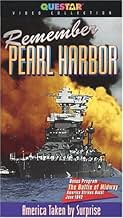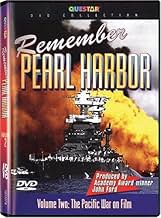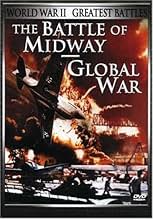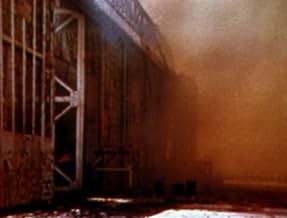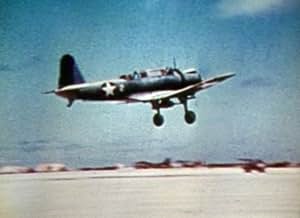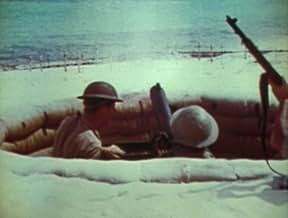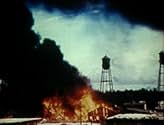AVALIAÇÃO DA IMDb
6,1/10
2,4 mil
SUA AVALIAÇÃO
Adicionar um enredo no seu idiomaThe Japanese attack on Midway in June 1942, filmed as it happened.The Japanese attack on Midway in June 1942, filmed as it happened.The Japanese attack on Midway in June 1942, filmed as it happened.
- Direção
- Roteiristas
- Artistas
- Ganhou 1 Oscar
- 1 vitória no total
Henry Fonda
- Narrator
- (narração)
Jane Darwell
- Narrator
- (narração)
James Roosevelt
- Self - US Army Major
- (as Major Roosevelt)
Donald Crisp
- Main Narrator
- (narração)
- (não creditado)
Irving Pichel
- Narrator
- (narração)
- (não creditado)
Jimmie Thach
- Self - Naval Aviator
- (não creditado)
- Direção
- Roteiristas
- Elenco e equipe completos
- Produção, bilheteria e muito mais no IMDbPro
Avaliações em destaque
John Ford's celebrated 19-minute documentary about America's first major victory of World War Two earned him a shrapnel wound, a Purple Heart and an Oscar. The first 10 is impressive without being that interesting - hard-won battle footage that largely consists of some stuff setting on fire, the camera shaking, the film cutting, then something else setting on fire - though the raising of the flag is a lovely moment, narrator Irving Pichel intoning: "Yes, this really happened". The second half is more obviously Fordian, the elegiac tone reinforced by hymns, slanting shadows and Jane Darwell's frenzied, corny, but effective narration. Audiences wept and fainted during the passage where she urges ambulance-men to rush injured soldiers to a hospital. Ford would make his definitive statement on the war, and the nature of heroism, with 1945's They Were Expendable, but this short is well worth a look.
This short piece of film shows parts of, as the title already tells us, of the battle of Midway, and some moments after it. The director is John Ford and what he creates with this short documentary is pure Hollywood war propaganda. There is a storyline that even includes the women at home waiting for the fighters. During some scenes a dialogue between Jane Darwell and the great Henry Fonda is heard on the background.
The images of the battle, shot in color, have historic value and are pretty exciting. The heroic tone is easy to understand, although now it is easy to see past that. Everything, including its Oscar win, seems to be there for propaganda purposes, making the people at home feel good enough about the war that is going on. In the end 'The Battle of Midway' is an interesting little film, but not that much more.
The images of the battle, shot in color, have historic value and are pretty exciting. The heroic tone is easy to understand, although now it is easy to see past that. Everything, including its Oscar win, seems to be there for propaganda purposes, making the people at home feel good enough about the war that is going on. In the end 'The Battle of Midway' is an interesting little film, but not that much more.
Battle of Midway, The (1942)
*** (out of 4)
Henry Fonda and Donald Crisp add narration to the battle scenes shot by John Ford where the director was even wounded by enemy fire. There's really no story being told in this documentary but instead we just see a part of history in beautiful Technicolor. God knows everyone has seen countless war films but there's something unique seeing real ones here. They certainly look a lot different than what we've seen in countless fake movies.
Ford's World War 2 shorts are out there in various forms ranging from public domain companies to the Ford at Fox set. Quality various but the version in the Fox set is the best.
*** (out of 4)
Henry Fonda and Donald Crisp add narration to the battle scenes shot by John Ford where the director was even wounded by enemy fire. There's really no story being told in this documentary but instead we just see a part of history in beautiful Technicolor. God knows everyone has seen countless war films but there's something unique seeing real ones here. They certainly look a lot different than what we've seen in countless fake movies.
Ford's World War 2 shorts are out there in various forms ranging from public domain companies to the Ford at Fox set. Quality various but the version in the Fox set is the best.
A documentary short, directed by John Ford. Covers the Battle of Midway, one of the most decisive battles of WW2. Taking place near the island of Midway in the central Pacific in June 1942, the battle turned the tide of the Pacific Theatre. Ford uses actual footage from the battle and the aftermath, with narration by Henry Fonda.
During WW2 the US used its mighty film industry to its advantage, producing high-quality news reels. documentaries and propaganda films. For this they enlisted some of the foremost directors of the age: Frank Capra, William Wyler, John Huston, John Sturges and John Ford, among others. Here, John Ford (or should I say, Lt. Commander John Ford, USNR) does his bit.
He does fairly well, capturing some great footage of the battle. It is more the editing and over-the-top, hammy added-on dialogue that weaken the film, and only when viewed with a 21st century lens. Propaganda films never have the same impact when viewed outside of wartime.
The movie went on to win the Best Documentary Oscar in 1943.
During WW2 the US used its mighty film industry to its advantage, producing high-quality news reels. documentaries and propaganda films. For this they enlisted some of the foremost directors of the age: Frank Capra, William Wyler, John Huston, John Sturges and John Ford, among others. Here, John Ford (or should I say, Lt. Commander John Ford, USNR) does his bit.
He does fairly well, capturing some great footage of the battle. It is more the editing and over-the-top, hammy added-on dialogue that weaken the film, and only when viewed with a 21st century lens. Propaganda films never have the same impact when viewed outside of wartime.
The movie went on to win the Best Documentary Oscar in 1943.
There have been many battles in the Second World War that played a part in deciding who the victors of the conflict were going to be, and one of these engagements is known as the Battle of Midway. Like any good ww2 film, this short combines good narration with impressive archive footage that was taken while the battle was ongoing. If that weren't enough, John Ford, one of the greatest geniuses in cinema history, directed this. The film starts with the narrator, Donald Crisp, telling the audience where Midway Island is located and why it holds such significance to the United States military. The film then goes on to show footage of the event that has often been cited as one of the most successful military engagements ever. At Midway, Japanese forces took 20 times the amount of casualties the Americans did, and american carrier aircraft managed to sink all 4 of the aircraft carriers responsible for attacking Pearl Harbor half a year earlier. This all took place only in June 1942, but even just 6 months into America's involvement in the war, they dealt a blow to japan from which they never really recovered. The footage of this event that Ford captured is remarkable because he was so close to the action. Many marines and other servicemen were killed on the island as japanese planes attacked from every conceivable angle, but Ford kept filming. You can see proof of this at one part where the camera gets knocked over by some kind of explosion. Aside from the exciting footage of combat and naval warfare, there isn't too much else to this short. It deserves praise because John Ford risked dying in action in order to record most of it, but at the same time, it's been eclipsed by a lot of other world war 2 related films that also showcase footage of this battle. What makes this one stand out after so many decades is the fact that its director was actually there in the midst of it, something that no modern documentary can boast. Because of this (and the huge interest I have in ww2 things) I have to consider Battle of Midway as one of the most iconic and well made second world war films. It goes without saying that this won an Oscar as well.
Você sabia?
- CuriosidadesDirector John Ford and cinematographer Joseph H. August were wounded by enemy fire while filming the battle.
- Citações
Main Narrator: Midway Island. Not much land right enough, but it's our outpost. Your front yard.
- ConexõesEdited into Ils ont filmé la guerre en couleur (2000)
- Trilhas sonorasAmerica, My Country Tis of Thee
(1832) (uncredited)
Music by Lowell Mason, based on the Music by Henry Carey from "God Save the King" (1744)
Words by Samuel F. Smith
Played in the score and later sung by an offscreen chorus
Principais escolhas
Faça login para avaliar e ver a lista de recomendações personalizadas
Detalhes
- Tempo de duração18 minutos
- Mixagem de som
- Proporção
- 1.37 : 1
Contribua para esta página
Sugerir uma alteração ou adicionar conteúdo ausente


